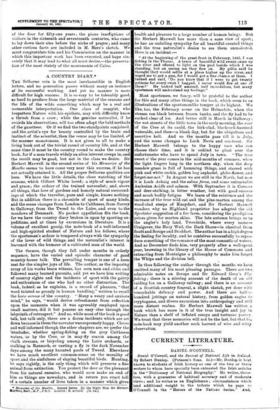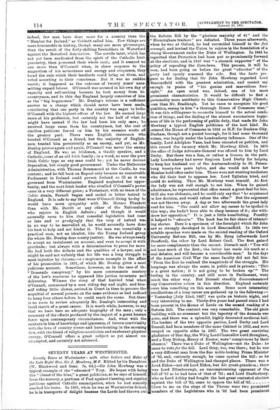C URRE NT LITERATURE.
DANIEL O'CONNELL.
Daniel O'Connell, and the -Revival of National Life,in.Ire14)01, By Robert Dunlop. (Putnam's Sons. 53.)—Mr. Dunlop. is beat known to students of Irish history as one of the two or three writers to whoin have specially been entrusted the Irish articles in the "Dictionary of National Biography." He writes, there- fore, with a guarantee of habitual accuracy and of moderate views ; and he writes as an Englishman ; circumstances which lend additional weight to the tribute which he pays to O'Connell in the "Heroes of the Nations Series." And, indeed, few men have done more for a country than the "Member for Ireland," as Cobbett called him. Few things are wore honourable in history, though many are more picturesque, than the revolt of the forty-shilling freeholders in Waterford against the Beresford domination. The servile taint, which has not yet been eradicated from the spirit of the Catholic Irish peasantry, then possessed their whole soul ; and it amazed no one more than O'Connell when, in sheer response to the magnetism of his earnestness and energy and eloquence, they faced the ruin which their landlords could bring on them, and voted according to their conscience. But it was no sudden result; it happened as the outcome of twenty years' unre- aaitting unpaid labour. O'Connell was accused in his own day of rapacity and self-seeking because he took money from hi, countrymen, and to this day England largely conceives of him as the "big beggarman." Mr. Dunlop's volume is a sufficient answer to a charge which should never have been made, considering that one party in the country was eager to bribe O'Connell with the highest offices of the law. He earned large sums at his profession, but certainly not the half of what be might have earned if the law had been his only oare ; he received large sums from his countrymen, but the cost of election petitions forced on him by his enemies wrote off the greater part. There were English statesmen who treated O'Connell as a friend, but the majority of English- men treated him persistently as an enemy, and yet, as Mr. Dunlop proves again and again, O'Connell was never the enemy of England. He was an Irishman, a Gaelic speaker, and a Catholic, come of an old Irish family ; in a word, as near the pure Irish Celtic type as any man could be ; yet he never desired Separation, but simply good government. Under the Melbourne Administration, with Thomas Drummond at the Castle, he was content ; and he fell back on Repeal only because no conceivable Parliament in Ireland could govern Ireland so ill as it was governed from Westminster. England neglected her oppor- tunity, and the next Irish leader who rivalled O'Connell's power came in a very different guise; a Protestant, with no trace of the Celtic strain, Parnell began and ended in bitter hatred to England. It is safe to say that were O'Connell living to-day he would have more sympathy with Mr. Horace Plunkett than with Mr. Devitt or any other of the Nationalists who rejoice in English defeats ; and though it would assuredly seem to him that remedial legislation had come so late and so grudgingly that the crop of hatred was in no way to be marvelled at, he would assuredly have done his best to help and not hinder it. The man was essentially a practical man, not an idealist, like the Young Ireland group (to whom Mr. Dunlop does scanty justice). He was always ready to accept an instalment on account, and even to accept it with gratitude ; but always with a determination to press for more He had both the defects and the qualities of a lawyer, and it might be said not unfairly that his life was a long struggle to meet injustice by chicane,—a conspicuous example is the affair of his prosecution in 1831, of which Mr. Dunlop gives a most judicious account. Sometimes, however, as in the case of the- " Doneraile conspiracy," by his mere consummate mastery of the law's resources he appeared like justice incarnate and delivering. Witness the story of that hurried trial when O'Connell, summoned by a man riding day and night, and him- self riding little slower, arrived in Court in time to procure the acquittal of several persons on the same evidence as had sufficed to hang four others before he could reach the scene. But there is no room to review adequately Mr. Dunlop's interesting and lucid sketch of a great career. It is worth while, however, to say that we have here no adequate biography of the man ; only a summary of the effects produced by the impact of a great human force upon contemporary circumstances. And, what with the mixture in him of knowledge and ignorance, of tavern conviviality with the love of country scenes and hare-hunting in the morning dew, with the blend of religious asceticism and exuberant physical energy, O'Connell offers a great subject as yet almost un- attempted, and certainly not achieved.



















































 Previous page
Previous page